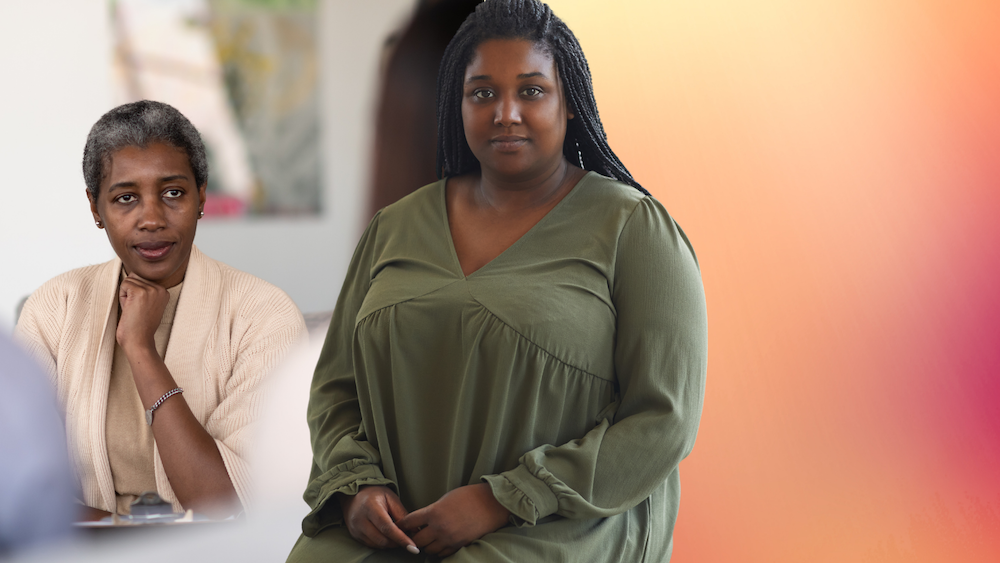Should your therapist be Black for you to fully get the benefit of the experience?
Following the global pandemic, mental health is more apparent and spoken about now than ever before. But in the Black community there is still a stigma around conversations on mental health and seeking help. For years, therapy has been associated with white privilege and is often perceived as a luxury for those who can afford the money and time to commit to the process. Thankfully, nowadays, more and more people are turning to therapy to help them recover from childhood traumas, heal from broken relationships and develop the confidence to become their truest, most confident self.
However, due to the common view that therapy is a white-dominated space, it is no wonder that other Black and ethnic groups may feel nervous about opening up to someone who they feel will not understand them or their point of view.
Last month, during a powerful interview on Pass The Mic, hosted by Julie Adenuga, Candice Brathwaite stated unequivocally that she would never consider using a therapist who wasn’t Black. She stated: “Yes, as a Black person, your therapist has to be Black […] Because there are moments in therapy when I don’t have to say anything. I can just throw up a look and say, ‘you get me?’, and she does get me…”
To explore this viewpoint in more detail, we spoke to Cydelle Stewart – a Black-British online business expert – who, based on her own personal experience says she would only ever use a Black therapist. Intrigued we caught up with Cydelle to explore her reasons for why she held this view. Read on…
View this post on Instagram
Hi Cydelle. So, tell us about where your therapy journey began?
My mum died a few years ago and I found myself struggling, I knew I needed help, but I was avoiding it at the same time. I was looking for escapism, so I decided to move abroad and work remotely to help uplift my mood by going somewhere sunny. I booked a ticket to Barbados and stayed there for six months, which really helped. But when I got back, I started to struggle again so I decided to sign up for therapy.
What was your experience with therapy like?
After seeing a white therapist, I realised that although she was a nice person, she didn’t quite understand the nuances of being Black, our culture or the shame that we deal with [regarding mental health] so it took me a little longer to explain these things before we got to the real root of my problems. The reality is when you only have a 30-minute session booked, you just don’t have the time to unpack and explain what is going on to someone who you can’t relate to.
How did you manage to find a Black therapist and what was that experience like?
After a quick Google search, I came across the Black, African and Asian Therapy Network online which caught my attention. I registered for a session and was allocated a Black therapist around the same age as me who I instantly clicked with. It was so easy to open up and discuss some of the things that I was dealing with. After regular sessions for a lengthy period of time, my therapy came to a natural close – I did start to feel more like I was speaking with a friend, so I knew it was then time to move on. I also felt like as someone who is self-employed, it started to feel like a luxury paying for this service on an ongoing basis. I then got a call back from NHS Talking Therapies who referred me to a white CBT therapist, but it was like starting for scratch and it felt like a lot of work.
Why do you think many people in the Black community have a negative outlook on therapy or seeking help?
I think it’s the perpetual consequences of generational shame that’s within the family and being taught not to speak up because it’s shameful. In Black families you put up and shut up – you are expected to be strong. The idea of the strong Black woman is also another reason why people don’t go to therapy – it’s almost like people think that we don’t need it. We are taught to not talk about our problems and to not trust anyone outside of the family, I believe that because our parents didn’t go to therapy, we are now dealing with their trauma as a result.

What advice would you give to someone who is struggling with mental health and needs help?
Contact Black, African and Asian Therapy Network and request a taster session with a therapist. Therapy sounds like a big scary thing but actually you are just speaking and offloading and it’s such an immense feeling when you have the first session. Give yourself the blessing of a release and stop punishing yourself.















